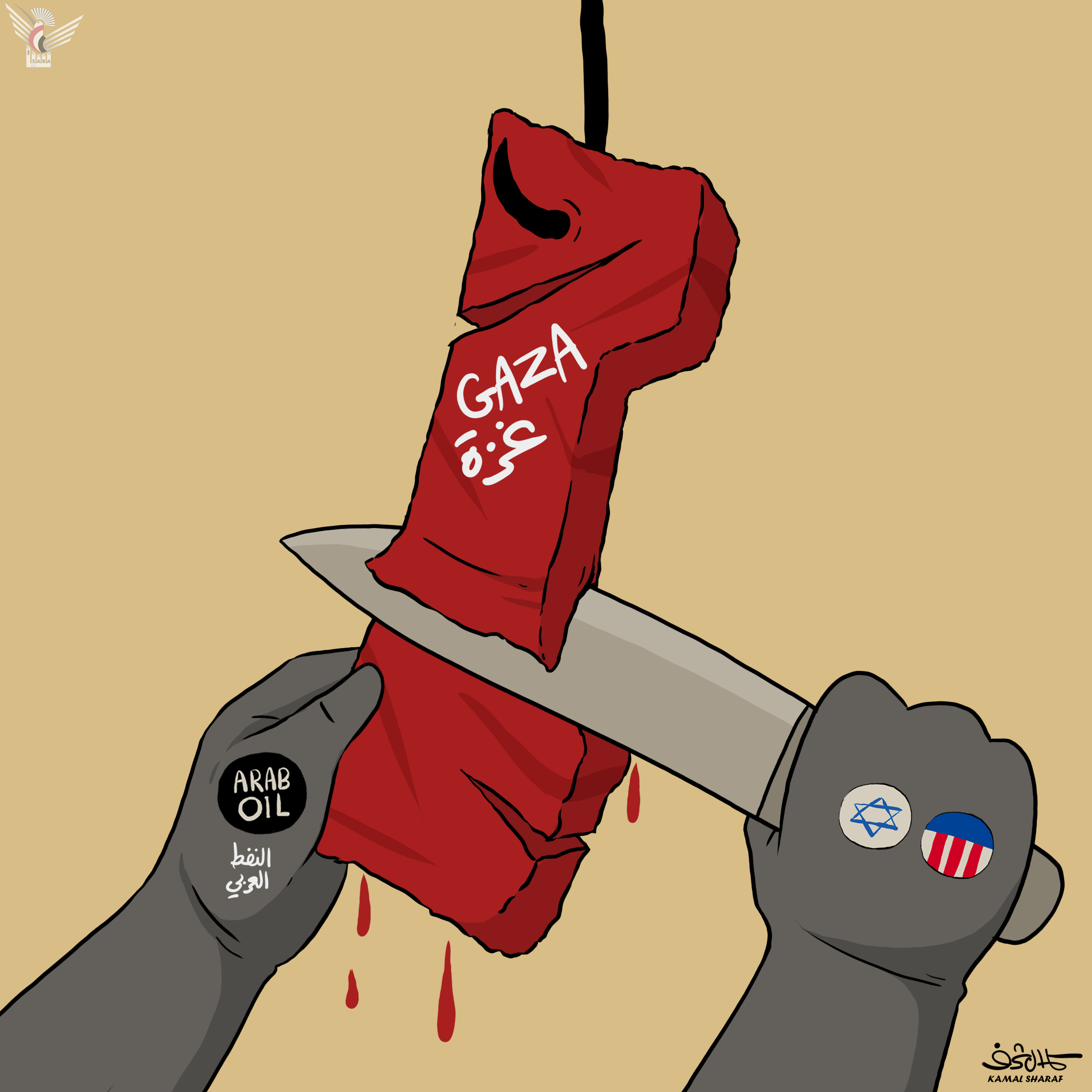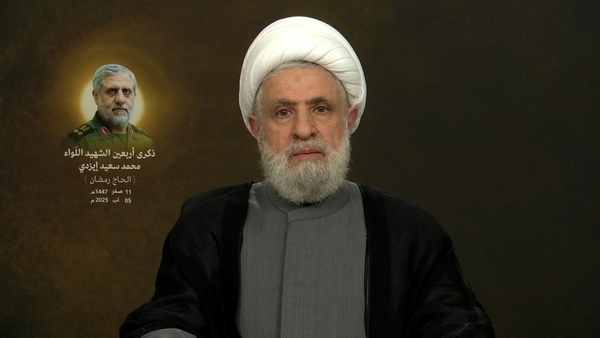Beirut – Saba:
Secretary-General of Lebanon's Hezbollah, Sheikh Naim Qassem asserted on Tuesday that the party is not concerned with disarming the resistance to appease the Israeli enemy. He stated that the United States and a certain Arab country are exerting intense pressure to impose the disarmament agenda.
Speaking at the 40th-day commemoration of the martyrdom of Iranian Revolutionary Guard commander Brigadier General Mohammad Yazdi (Hajj Ramadan), Sheikh Qassem said:
"A clear item must be added to the Lebanese Cabinet’s agenda: how do we confront Israeli aggression and protect our sovereignty? What practical measures are required? How can parties, forces, sects, the people, and all stakeholders participate in the defense of Lebanon? How do we collectively expel the Israeli occupation and intensify pressure on the enemy through its complicit sponsors or other means? The issue is not disarming the resistance."
He added, "If you truly support Lebanon, then support the cessation of aggression, the removal of Israeli occupation, the launch of reconstruction, and the release of prisoners. After that, come talk to us about any issue— we are ready."
Qassem affirmed that the resistance is part of the Taif Agreement and explicitly included in the national defense measures to protect Lebanon by all means necessary. He stressed that constitutional matters cannot be decided by voting but require consensus and cooperation among all components of society.
He further stated, “Just as ending political sectarianism requires national consensus, and as sectarian-based power-sharing is considered a foundational principle, so too is the resistance against Israeli occupation a national principle that can only be addressed through mutual agreement.”
Calling for a national dialogue on a unified security and defense strategy, Sheikh Qassem emphasized:
“National security goes beyond the issue of arms. It involves the consolidation of strength, unity, and the defense of Lebanon against the Israeli enemy. A strategy does not mean disarmament under a timeline, as some imagine.”
He expressed disappointment that instead of engaging with the resistance in such a dialogue, some political actors have reduced the discussion to the singular demand of disarmament—without presenting any viable vision for national security. “We reject this,” he said, “and we consider ourselves an essential component of Lebanon. We must revisit how this issue is approached.”
Qassem stressed Hezbollah’s commitment to continued dialogue and cooperation with Lebanon’s three top leaders and warned against internal pressure tactics. “No one should feel pressured into imposing internal constraints. Lebanon’s unique interests must be preserved.”
He also cautioned against following external dictates:
“No one in this country is comfortable. We’re all under pressure. But let’s be clear—these are internal matters that should only be discussed among Lebanese. No one has the right to impose external agreements on us. We seek an internal agreement rooted in sovereignty and independence.”
He reiterated that resolving any crisis in Lebanon must come through consensus, within institutions, and with the Lebanese army and resistance, which together form an inseparable part of the national fabric.
Sheikh Qassem said the Lebanese state can now assert its responsibility for the southern and eastern borders before the international community, adding that the state has proven capable of maintaining internal order and preventing massacres and unrest in villages.
“No one has the right to deprive Lebanon of its sources of strength that protect its sovereignty,” he stressed. “This must be firmly established in everyone’s mind. The resistance, the army, and the people have made tremendous sacrifices. No one should take that lightly.”
He continued: “Those who sacrificed and liberated the land are more patriotic than those who destabilized the country and killed civilians. No one can outbid us on patriotism. We have a proud history, embodied by the master of the martyrs of our nation, Sayyed Hassan Nasrallah (may God be pleased with him), who died a brave martyr and gave more to humanity, Palestine, and Lebanon than many others.”
He added that Israeli aggression was aimed at reaching Beirut and changing Lebanon entirely, but the resistance, army, and people stood united and thwarted those plans.
He affirmed that the resistance is strong, capable, and determined to protect Lebanon’s sovereignty and independence. “The resistance community is steadfast, its fighters are fully prepared to sacrifice, and this is a reality well known to all.”
Qassem warned that Lebanon cannot commit to relinquishing its power while the Israeli enemy retains all its tools of strength. “Some justify disarmament by claiming it removes foreign pretexts—under threats of halting aid or imposing sanctions.”
He asked:
“What good is funding if we lose our decision-making, our sovereignty is violated, parts of our land remain occupied, and we’re left with no options? We’ll become slaves—and we refuse to be slaves to anyone, not the United States, nor some Arab countries, nor any foreign power.”
He noted that current pressure tactics aim to instill fear of war and expand aggression. “Why is Israel relying on limited attacks and American political pressure, rather than launching a full-scale war? Because it knows such a war would not serve its interests. The resistance, army, and people will fight back, and missiles landing inside Israel could dismantle its eight-month-long illusion of security within an hour.”
He concluded, “The enemy knows the response would be costly, and that’s why it avoids full war. We must not let anyone intimidate us. Would the aggression end if we give up everything? No! On the contrary, the less we have, the more likely we are to be attacked.”
Qassem underscored that no one will protect Lebanon or its people if it surrenders, citing recent remarks by Israeli Finance Minister Bezalel Smotrich, who said the Israeli army would not withdraw from five southern Lebanese points and that destroyed villages would not be rebuilt.
“Doesn’t this clearly mean the occupation insists on keeping its grip over Lebanon?” he asked.
He stressed that relying on foreign actors is futile. “If the international community truly wants Lebanon’s stability, it will eventually respect its will—if Lebanon stands firm. If not, no amount of concessions will matter.”
He concluded by saying:
“This battle touches the very core of Lebanon’s identity. Either Lebanon wins—all of Lebanon—or it loses—all of Lebanon. No single side can win while others lose. We will all win together or lose together. And we firmly believe we can win together.”
Addressing the Palestinian cause, Sheikh Qassem highlighted the immense suffering of the Palestinian people:
“No nation on Earth could endure what the Palestinians are enduring—over 61,000 martyrs, 150,000 wounded, and more than 2.2 million displaced, moving from place to place, hunted down and starved, killed while searching for food and aid.”
He described this as "a systematic genocide enabled by the collusion between the United States and the Israeli regime to erase the Palestinian people and take their land."
However, he affirmed that: “Despite this, the Palestinian people have stood firm for 77 years, carrying the banner of resistance and justice, and remain steadfast on the path to victory.”

| more of (International) |




